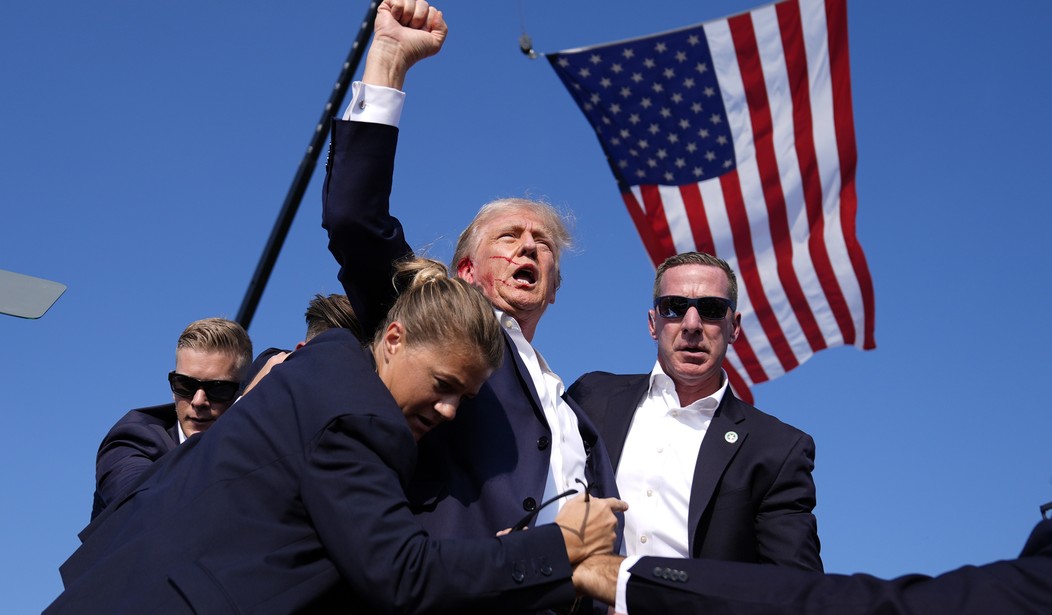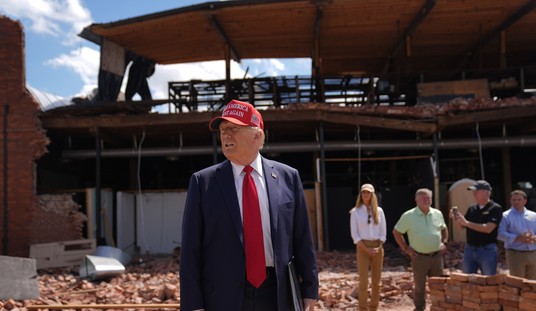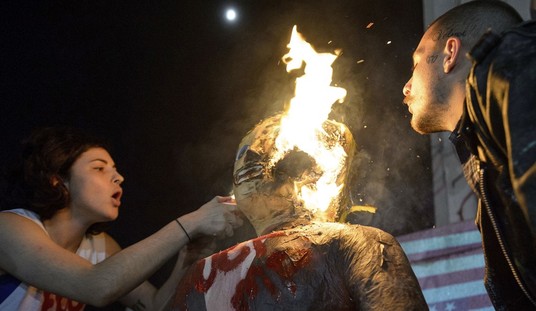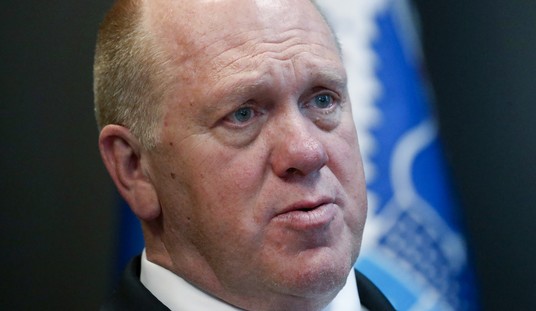In the lead-up to the 2024 presidential election, Politico published a lengthy piece fantasizing in vivid detail about Donald Trump overturning the race results and "install[ing] himself in the White House."
The fan fiction — titled "'The Threat Remains': Trump's Path to Overturning a 2024 Defeat" — imagines a "very real" scenario where the GOP nominee loses in November but seizes power anyway.
NEW: Could a defeated Donald Trump subvert the 2024 election?
— Kyle Cheney (@kyledcheney) October 20, 2024
The answer: Yes, BUT the path is far narrower, even more extreme and would require an enormous amount of help from GOP power brokers — who first need to win their own elections.
Our deep dive: https://t.co/tC6sNawEEe pic.twitter.com/x6FHkW1oZ4
"Here's how it could happen," according to what Politico's top minds could muster after talking to dozens of so-called "experts," election officials, and legislators. Politico provides actual dates corresponding with their predicted timeline of events as well as Orwellian imagery to accompany each premonition:
November 5, 2024 - December 11, 2024
It starts with Trump "sowing distrust," something the deep dive says he's "already doing: stoking deep, unfounded doubts about the integrity of the election."
He will "deepen" this distrust in the election results, Politico says, by "making unsupported or hyperbolic claims of widespread voter fraud and mounting longshot lawsuits challenging enough ballots to flip the outcome in key states."
But Trump isn’t president. He doesn’t have the military or DOJ to wield to this end. And the updated Electoral Count Act has, on paper, foreclosed most routes to subversion. Thats why he would need congressional Rs to embrace fringe legal theories to sidestep the laws.… pic.twitter.com/SkP9oqyznp
— Kyle Cheney (@kyledcheney) October 20, 2024
Recommended
Politico predicts that Trump then ramps up pressure during state certification.
In this new atmosphere, it's easy to envision a perilous scenario:
A key swing state takes several days to finish counting votes. Harris edges Trump by a few thousand ballots, appearing to clinch the election. Trump then blankets the state with ads exhorting officials to 'stop the steal,' sends top allies to rail daily outside counting facilities about a crooked process, files a blizzard of litigation urging judges to throw out ballots being counted after Election Day and spreads claims that the vote was swung by non-citizens. Threats rain down on election officials and vote counters, with protests driving up the local and national temperature. Then, Trump allies on a handful of county election boards resist certification, threatening to disenfranchise thousands of voters and disrupt the state's effort to finalize an accurate count.
December 11, 2024 - December 17, 2024
Next, per Politico, Trump convinces allies among Republican-led swing state legislatures to appoint alternate electors to send to Congress.
December 17, 2024
Once the results are delivered to Congress, presidential electors meet in "an atmosphere of threats." Here, "the prospect of disruption, and even violence, is at its peak," Politico foresees.
"Anybody involved in certifying Trump's defeat should he lose is a potential target," a senior advisor to the January 6 committee told Politico. "The extremists or even just rabid wackadoodles firmly believe it's being stolen yet again."
Don’t expect fake electors to meet. There’s no purpose. They don’t want criminal charges and Kamala Harris will be presiding and obviously not consider bogus slates. The route to watch is rogue state legislatures endorsing alternate slates. https://t.co/tC6sNawEEe pic.twitter.com/sERn3fpxNf
— Kyle Cheney (@kyledcheney) October 20, 2024
December 18, 2024 - January 6, 2025
The penultimate step is persuading a GOP-led Congress to endorse Trump's electors and spurn those for Harris when congressional members convene to certify the outcome. Via Politico [emphasis added]:
That's because all roads lead to Jan. 6, 2025, the day the House and Senate must fulfill their constitutional requirement to meet jointly and count the votes cast by the Electoral College — and just three days after the newly elected Congress takes office.
In 2020, Democrats and then-Speaker Nancy Pelosi controlled the House, so Trump pinned his hope to subvert the election on the fact that Pence would be presiding over the joint session of Congress. Eastman, Chesebro and others had helped develop a theory that Pence could unilaterally refuse to count Biden's votes, either delivering the election to Trump or forcing a delay that might give Republican state legislators more time to appoint pro-Trump electors.
Pence spent weeks refusing to declare his intentions but ultimately resisted, and Trump supporters rioted at the Capitol.
This time, the person presiding over the proceeding will be Harris herself — and she has pledged to adhere to the Electoral Count Act's description of her duties as 'ministerial,' with no room to exercise power over the outcome.
Under the Electoral Count Act, Congress convenes in the House chamber at 1 p.m. with Harris presiding. With the assistance of House and Senate 'tellers,' the vice president then opens envelopes containing the certified electoral ballots from each state alphabetically and tallies the votes. If there are no objections, a winner is announced.
In previous years, a single member of the House and Senate could join together to challenge the electors certified by any state, forcing the session to recess for a two-hour debate and vote on whether to count the challenged electors. The updated Electoral Count Act raised that threshold to one-fifth of each chamber — 87 House members and 20 senators. Still, it may not be hard for a group of pro-Trump Republicans to reach those thresholds. The law also requires both chambers to agree to an objection for it to succeed — though a split Congress would present messy constitutional questions. No challenge under this process has ever succeeded.
January 6, 2025
We've entered the end game. "This phase would mark the culmination of Trump's ceaseless campaign to cast doubt on any election defeat and lay the groundwork for an alternative reality," Politico says.
Exactly four years after J6, Trump makes his "final move to seize power" at a joint session of Congress.
Here is where Trump loyalists could try to seize power for their defeated candidate.
It begins with whoever is the speaker of the House. Though Rep. Mike Johnson holds the job today, he's no lock to win renewed support from his restive Republican conference. Trump would once again likely play kingmaker, with the power to extract promises for his endorsement. In a scenario in which Trump is still challenging the election, a commitment to side with him during the Jan. 6 session of Congress would be at the top of his list.
If Republicans can't resolve the speaker fight before Jan. 6 — which was nearly the case in 2023, when Kevin McCarthy claimed the gavel after 15 votes and three days of infighting — it would usher in another kind of unprecedented crisis: a leadership vacuum that would complicate the ability of Congress to convene on Jan. 6 altogether. No one knows what would happen in that scenario, but congressional aides and lawyers are beginning to contemplate strategies for even the wildest contingencies.
Now assume Johnson retakes the gavel. Though Harris will preside, the session occurs in Johnson's chamber, where the speaker holds significant sway.
[...]
If Johnson believes, like Eastman, that the laws governing the joint session are unconstitutional, he could assert unprecedented authority to affect the process — all under the guise of following the Constitution. That could include taking steps to ensure that pro-Trump electors embraced by state legislatures get an up-or-down vote, even if they conflict with slates endorsed by governors. It could include permitting hours of floor time to air theories of voter fraud, while holding the presidency in limbo. It could also include lobbying allies to reject pro-Harris electors in order to prevent either candidate from receiving 270 Electoral College votes. And it could also include simply gaveling the House out of session to prevent the joint session from continuing. Each move would likely trigger intense legal battles, putting the courts — and most likely the Supreme Court — in the position of deciding how to resolve unprecedented power plays by the most prominent actors in government.
[...]
If Republicans, through the speaker's maneuvering, prevent either candidate from garnering an Electoral College majority, it would trigger what's known as a contingent election in the House, with each state delegation getting a single vote. Republicans control 26 state delegations to Democrats' 22, with two others evenly split. The GOP is favored to maintain that advantage, and Republicans would almost certainly choose to elect Trump president.
2024 is not 2020. Trump being out of power changes the equation. But the transfer of power if he loses is still likely to be perilous — particularly if, as expected, he declares victory on Election Day.
— Kyle Cheney (@kyledcheney) October 20, 2024
w/ @HeidiReports @johnnysaks130 @lisakashinsky https://t.co/tC6sNawEEe pic.twitter.com/nUFx4FQB3e
Those theorizing about Trump's takeover are Politico's senior legal affairs reporter Kyle Cheney, national investigative correspondent Heidi Przybyla, cybersecurity reporter John Sakellariadis, and national political reporter Lisa Kashinsky — all co-authors of the thinkpiece.
"Ultimately, a handful of key pieces would have to fall into place to prevent the certification of a Harris victory: It would require a good election night for Republicans and significant complicity among Trump allies at virtually every level of government," they conclude.
This reaches a "realm of lawlessness," UCLA law professor Rick Hasen told Politico. If the Trump camp declares their preferred candidate the winner, "then you're talking about a real coup," Hasen said, though that's exactly what the Democratic establishment did when they ousted Joe Biden, the winner of the party's primaries and elected choice of more than 14 million registered Democrats.
"No one knows exactly what Trump's attack on the electoral system will be in 2024," remarked Rep. Jamie Raskin (D-MD), a majority member of the January 6 select committee. "What will he do this time?"
According to Politico, Trump's allies say he is "singularly focused on winning the election outright and has not personally engaged in the war-gaming scenarios" like this elaborate exercise. "The Trump campaign declined repeated requests for comment about Trump's plans for the post-election period and whether he has deputized allies to consider all contingencies."
Politico neglected to give Harris equal scrutiny, stating: "If Trump wins, no one expects a comparable effort by Democrats to subvert the election."

























Join the conversation as a VIP Member